
As per C.B.S.E. the school follows a system of continuous and comprehensive evaluation (CCE) that covers all aspects of the students’ development ensuring their intellectual, emotional, physical, cultural & social development and not merely limited to academics till primary grades.
The academic year is divided into four Boosters. School is conducting fun loving assessments which are based on orals, activities, projects and worksheets. The child’s progress is shared regularly on P.T.M’s through the grading system.
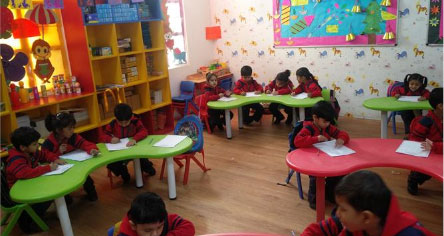
The academic year has two terms of 100 marks each.
FIRST TERM: April to September- Periodic 1 (40%) + Half Yearly (60%) wherein 5% weightage of Notebooks and 5% weightage of Subject enrichment activities
SECOND TERM: October to March- Periodic 2 (40%) + Annual exam (60%) wherein 5% weightage of Notebooks and 5% weightage of Subject enrichment activities
Grade 1 to IV: Covering syllabus as provided
Grade V: Term 1: Entire syllabus covered till then.
Term 2: 10% of Term 1 syllabus alongwith entire syllabus of Term 2
The students are awarded grades alongwith their marks score.

As per C.B.S.E's new format- 'uniform system of assessment, examination and report card' - every learner is evaluated in two terms in an year. Each term specifying marks score for periodic, notebook and subject enrichment in each subject and the corresponding grades.
It also has co-scholastic assessment where students are graded on a 3-point scale.
Term 1 exams for all the classes from VI onwards are based on syllabus covered till the exam time,
The syllabus for yearly exams i.e Term 2 covers increasing syllabus starting with 10% for class VI, 20% for class VII and 30% for class VIII.
C.B.S.E aspires to prepare the students for class IX and higher classes where they appear for exams or the entire syllabus, but gradually.
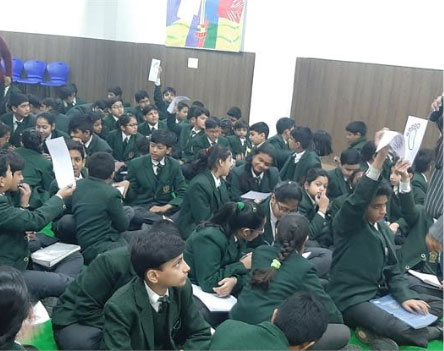
As per C.B.S.E, grade IX onwards students have to appear for exams for the entire syllabus at year end. Grade IX and Grade XI assessments will happen within the school whereas Grade X and Grade XIIstudent will appear for external examination i.e Board exams.
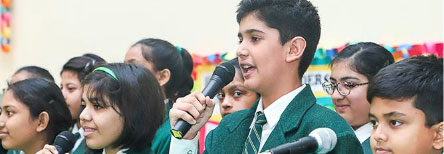
In the present times, knowledge cannot confine to textbooks. We are part of a world where education goes beyond school books. Delhi Public School comprehends the current trends and believes in leaving no stones unturned to educate its learners in all areas. We realize the worth of electronically supported learning and teaching. We have information and communication systems to assist learning.
The school aids them with Computer studios that have high-grade computers and projectors. Our computers are all high-quality TFT Screen units with ancillary printers and carefully monitored and filtered internet connectivity. Each child is provided with his or her own workstation and access to an individual computer. We spare no effort to prepare our learners for the global society and IT-driven world.
The Pre-primary wing of the school comprises classes of Pre-Nursery, Nursery, and Kindergarten and caters to the needs and demands of early childhood learning. Bearing in mind that at this age the foundation of a child's personality is laid and two-thirds of their intellect is formed, we have created an environment and a system of teaching which is entirely child-friendly. The classes have an exclusive domain and it is here that they learn social skills, free-play, develop the verbal ability and imbibe the skills and joy of creating things with their own hands through art and crafts which is an integral part of the curriculum. The curriculum is open-ended and focused on experiential learning. Formal learning of the three ‘R’s is introduced in Nursery. It finds a more prominent place in the Kindergarten curriculum which includes recognition, reading and writing of Hindi and English alphabets, small words and basic mathematical concepts. Environmental studies are taught with project-based activities and Life Skills are taught to make students more adaptable to different situations.
The focus in Kindergarten is on cognitive development and enhancement of language and interpersonal skills. Children are sensitized to social, cultural concerns and encouraged to think, reflect on issues and arrive at their own solutions. The main objective of the curriculum is to enable children to communicate effectively, develop integrated skills and creativity; for them to grow as confident and independent individuals.

The syllabus becomes more broad-based at this level and gradually the young learners are exposed to a wide range of subjects and study material which is suitably graded in accordance with the CCE. Apart from Math, English, Hindi, E.V.S. and Computer Education subjects like General Knowledge are also taught. As early as class I, students learn to work on computers in the Multimedia Lab which has been specially equipped to meet the needs of the young learners. From class III onwards, the school offers the students the choice to learn any one of the three languages- Sanskrit, German and French as Third Language. A plethora of choices given to the students for their Work Experience classes ranging from pottery to public speaking, cookery to clay modeling. Last but not the least in order to inculcate moral values and general awareness among students, interactive sessions are held in the Life Skills classes.
The teaching of all the subjects is done by using Smartboards. This audio-visual method makes learning a joyful experience for students.

From Class VI to class VIII the curriculum of all academic subjects as well as a variety of co-curricular activities encourages creativity, aesthetics, and adventure. All students study English, Hindi, Mathematics, Science (Physics, Chemistry, and Biology), Social Studies (History, Civics, and Geography) and third language (German, French or Sanskrit). Co-curricular activities include Socially Useful & Productive Work (Art, Music, Dance, Science Club, Geography Club, Literary Club) etc, Physical & Health Education and Computer Education.

Students of Class XI and XII may take Science, Commerce or Humanities course, each of which cover 5 subjects.
The Science Course: English, Physics and Chemistry are the compulsory subjects for the students
The Medical Stream: This has Biology as the fourth subject while the fifth subject can be Maths or Psychology.
The Non-MedicalStream : This has fourth subject as Mathematics and the fifth subject can be Computer Science or Economics.
The Commerce Course: English, Accountancy, Business Studies and Economics are compulsory subjects. For the fifth subject, students have a choice of Mathematics / Psychology.
The Humanities Course: English is a compulsory subject. Other choices are :
- Economics
- History / Fine Arts / Geography / Maths
- Political Science / Fashion Design
- Psychology
(Physical Education can be opted as the sixth subject in all the streams in class XII only.) The class XII course culminates in the All India Senior Secondary Examinations, which is also conducted by the Central Board of Secondary Education.
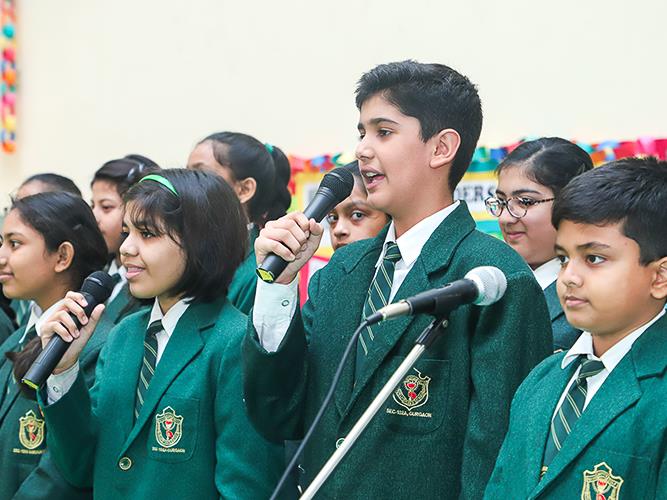
For us at Delhi Public School, the goal of education is the advancement of knowledge and the dissemination of truth. The methodology of teaching at the school is as follows:
To draw on the learner’s strengths and interests. Material and resources are drawn from and connected to real world.
This fosters participation and collaboration and allows the learner to interact with the real world.
This provides opportunities to learn through discovery which helps the learners to be the creators, thinkers and problem solver. This also includes the learner in the development of lessons and assessment process.
Provides the learner an opportunity to acquire knowledge in a more holistic way. It builds on a variety of disciplines and learning environments.
Subjects are taught as ways of thinking which rests on Intelligent Behaviours. It helps the learner to apply thinking models and diverse strategies and develops communication capacity.
Teaches national consciousness and orientation in relation to India.
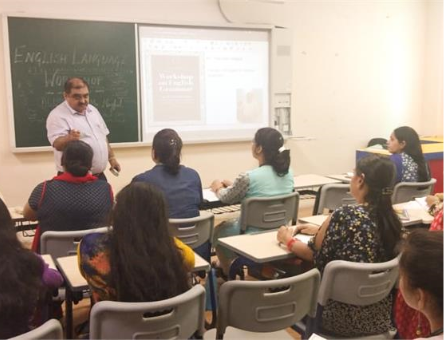
Delhi Public School, Gurugram has a Virtual School Program (VSP), a user-friendly online system that provides teachers, students and parents an exclusive access to all information concerning:
Children completely immerses themselves while engaged in these forms of learning. These visual programmes sensitize children to colour, space, textures and different materials. Art and craft activities allow children to express themselves and re-enforce concepts learnt within the classroom such as shapes, colours, and numbers. Performing arts also help children understand Indian and Western music and dance forms. Children enjoy the activities of these programmes as they are closely linked to classroom concepts.

In a world where social pressures and expectations are high, we help our children to accept and manage their emotions. Children spend a few minutes of tranquil time with themselves for quiet reflection. The early morning silence sets the tone for a challenging day at school with students focusing better on goals they need to achieve. The facilitators spend discussion time with children, helping them understand their needs and how to overcome their difficulties.
Physical development of the child is critical in the primary years. Our programme is developed keeping in mind the readiness of a child’s body for certain physical activities. In the early years children are exposed to Baby Gym for running, hopping, jumping and walking around patterns. Splash pool, sand pit and swings all ensure the development of gross motor skills. In the later years, children are introduced to sports like Tennis, Soccer and Basketball. Yoga constitutes an important part of physical education program of D.P.S. as it helps in the holistic development of body, mind and soul along with better focus and concentration.